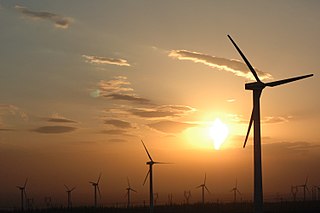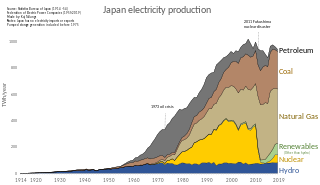This is a list of offshore wind farms in Japan. Japan intends to announce winners of a second contract round for 1.8 GW of capacity in March 2024. [1]
| Wind farm | Prefecture | Wind turbine model | Unit power (MW) | No. of Units | Total (MW) | Commissioning date | Developer | Owner / operator | Coordinates | Notes and references |
|---|---|---|---|---|---|---|---|---|---|---|
| Setana Wind Farm | Hokkaido | Vestas V47 | 0.6 | 2 | 1.2 | Close to shore [2] | ||||
| Sakata Offshore Wind Farm | Yamagata | Vestas V80 | 2.0 | 8 (3 onshore) | 16 | [3] | ||||
| Wind Power Kamisu | Ibaraki | Subaru 80 | 2 | 7 | 14 | January 2008 [4] | Mitsuuroko Green Energy CO [5] | Close to shore, survived exposure to the 2011 Tōhoku earthquake and tsunami. [6] [7] [8] | ||
| Fukushima Floating Wind Turbine | Fukushima | Hitachi | 2 | 1 | 2 | November 2013 | 32% cf, 20 km from shore. 66kV floating transformer [9] [10] [11] [12] [13] | |||
| Noshiro&Akita | Akita | Vestas | 4.2 | 33 | 140 | December 2022 | Marubeni | Tohoku Electric Power | [14] [15] | |
| Ishikari Bay Wind Farm | Hokkaido | Siemens Gamesa 8.0-167 DD | 8.0 | 14 | 112 | 2023 | JERA | Close to shore. 180 MWh battery. [16] |
| Wind farm project | Prefecture | Wind turbine model | Unit power (MW) | No. of Units | Total (MW) | Commissioning date | Developer | Owner / operator | Coordinates | Notes and references |
|---|---|---|---|---|---|---|---|---|---|---|
| Kitakyushu | Fukuoka | 44 | Kyuden Mirai | Cost 175bn yen ($1.5bn) [17] | ||||||
| Yurihonjo | Akita | GE | 12.6 | 65 | 819 | 2030 | Mitsubishi | Chubu | JPY 12/kWh [18] | |
| Noshiro | Akita | GE | 12.6 | 38 | 478 | 2028 | Mitsubishi | Chubu | JPY 13/kWh [18] | |
| Choshi | Chiba | GE | 12.6 | 31 | 390 | 2028 | Mitsubishi | JPY 16/kWh [18] |
Ōshima was a village located on an island in Kitamatsuura District, Nagasaki Prefecture, Japan.

Wind power in Germany is a growing industry. The installed capacity was 55.6 gigawatts (GW) at the end of 2017, with 5.2 GW from offshore installations. In 2020, 23.3% of the country's total electricity was generated through wind power, up from 6.2% in 2010 and 1.6% in 2000.

The Nunobiki Highlands Wind Farm is a wind farm operated by the electric utility company J-Power alongside Lake Inawashiro in Kōriyama, Fukushima, Japan. It is approximately 1,080 meters above sea level.

Sweden has a total of 16.4 GW of wind power capacity at the end of 2023, the 5th highest in Europe and most per capita. Wind power produced 19.4% of national electricity generation in 2022, up from 0.3% in 2000.

The Hokkaido Electric Power Company, or Hokuden (ほくでん) for short, is the monopoly electric company of Hokkaidō, Japan. It is also known as Dōden and HEPCO. The company is traded on the Tokyo Stock Exchange, Osaka Securities Exchange, and Sapporo Securities Exchange.

China is the world leader in wind power generation, with the largest installed capacity of any nation and continued rapid growth in new wind facilities. With its large land mass and long coastline, China has exceptional wind power resources: Wind power remained China's third-largest source of electricity at the end of 2021, accounting for 7.5% of total power generation.

In 2021 France reached a total of 18,676 megawatts (MW) installed wind power capacity placing France at that time as the world's seventh largest wind power nation by installed capacity, behind the United Kingdom and Brazil and ahead of Canada and Italy. According to the IEA the yearly wind production was 20.2 TWh in 2015, representing almost 23% of the 88.4 TWh from renewable sources in France during that year. Wind provided 4.3% of the country's electricity demand in 2015.

A floating wind turbine is an offshore wind turbine mounted on a floating structure that allows the turbine to generate electricity in water depths where fixed-foundation turbines are not feasible. Floating wind farms have the potential to significantly increase the sea area available for offshore wind farms, especially in countries with limited shallow waters, such as Spain, Portugal, Japan, France and the United States' West Coast. Locating wind farms further offshore can also reduce visual pollution, provide better accommodation for fishing and shipping lanes, and reach stronger and more consistent winds.
Goldwind Science & Technology Co., Ltd., commonly known as Goldwind, is a Chinese multinational wind turbine manufacturer headquartered in Beijing, China. Goldwind was a state-owned enterprise before 2007, with largest shareholders including Hexie Health Insurance, China Three Gorges Renewables Group, and the National Social Security Fund, state-controlled corporations holding almost 40% shares. Its founder, Wu Gang, is a Communist Party member and had a seat in the 12th National People's Congress.

Offshore wind power or offshore wind energy is the generation of electricity through wind farms in bodies of water, usually at sea. There are higher wind speeds offshore than on land, so offshore farms generate more electricity per amount of capacity installed. Offshore wind farms are also less controversial than those on land, as they have less impact on people and the landscape.

In Japan's electricity sector, wind power generates a small proportion of the country's electricity. It has been estimated that Japan has the potential for 144 gigawatts (GW) for onshore wind and 608 GW of offshore wind capacity. As of 2023, the country had a total installed capacity of 5.2 GW.

The electric power industry in Japan covers the generation, transmission, distribution, and sale of electric energy in Japan. Japan consumed approximately 918 terawatt-hours (TWh) of electricity in 2014. Before the 2011 Fukushima Daiichi nuclear disaster, about a quarter of electricity in the country was generated by nuclear power. In the following years, most nuclear power plants have been on hold, being replaced mostly by coal and natural gas. Solar power is a growing source of electricity, and Japan has the third largest solar installed capacity with about 50 GW as of 2017. Japan's electricity production is characterized by a diverse energy mix, including nuclear, fossil fuels, renewable energy, and hydroelectric power.
The Polish energy sector is the fifth largest in Europe. In 2023, the country consumed 167.52 TWh of electricity, a 3.44% year–on–year decrease from 2022. Out of this, 76.61 TWh came from hard coal, 34.57 TWh from lignite, 22 TWh from wind energy, and 13.65 TWh from gas, with the remainder coming from other sources, such as solar, biomass, and hydropower.
The Ukujima Mega Solar Plant project in Japan will be one of the world's largest photovoltaic power generation facilities at 480 MW(DC) and 400 MW(AC) respectively.

Wind power is a major industry in Taiwan. Taiwan has abundant wind resources however a lack of space on land means that most major developments are offshore. As of February 2020, there were 361 installed onshore turbines and 22 offshore turbines in operation with the total installed capacity of 845.2 MW.
Quick Corp. (株式会社QUICK) is a financial market information vendor headquartered in Tokyo, Japan. It was founded in 1971 as Quotation Information Center K.K. (株式会社市況情報センター), and changed its corporate name to the acronym "QUICK" in 1987. Quick has four offices in Japan as well as overseas offices in London and Hong Kong.
Takakonuma Greenland was a Amusement park near Date, Fukushima, Japan. It opened in 1973 but temporarily closed a few years later. It reopened in 1982 before permanently closing in 1999, the park was left abandoned until it was demolished between 2006 and 2007, the park has become an Urban Legend due to its apparent isolation and sometimes misty conditions.